Podcast: University leaders on “breaking the glass ceiling”
2024年2月29日
Rebecca Clear
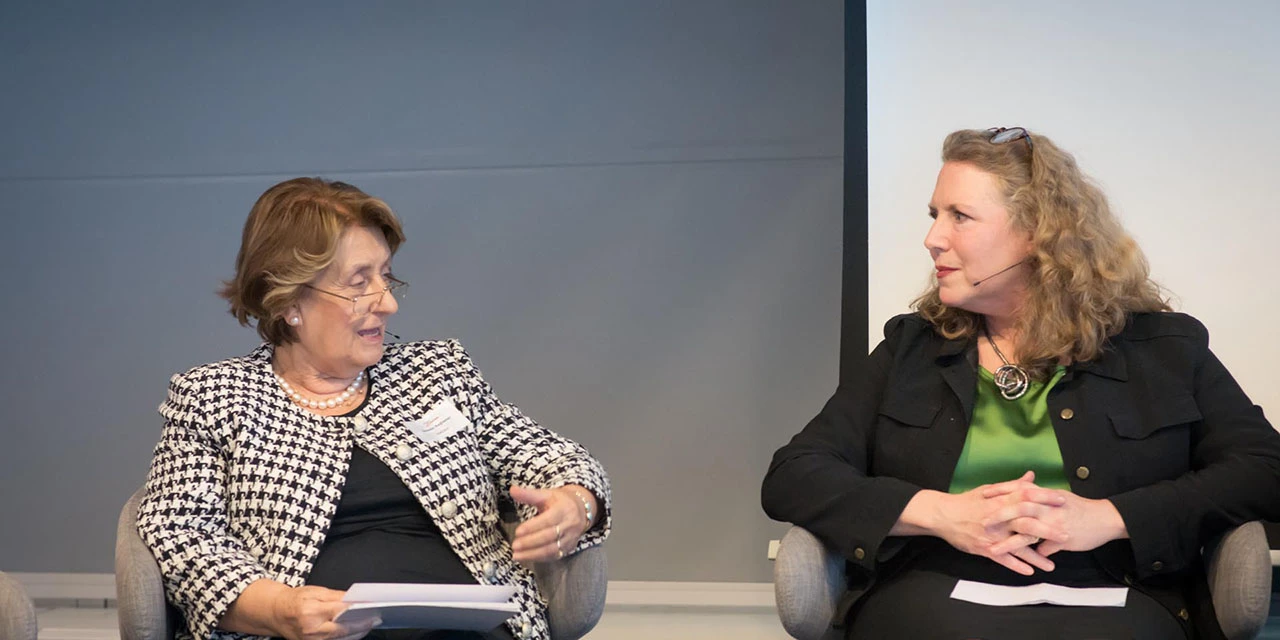
Prof Gülsün Sağlamer, Founding Honorary President of the European Women Rectors Association (EWORA), talks with Ylann Schemm, Executive Director of the Elsevier Foundation, on a Science|Business panel. (Photo by Denitsa Nikolova for Science|Business)
In a provocative new podcast series, 15 university leaders talk about gender inequality in academia and how we can best tackle it.
Elsevier’s report The researcher journey through a gender lens found that while the participation of women in research is increasing overall, inequality persists across geographies and subject areas in terms of publication output, citations, awarded grants and collaboration. While that report was published in 2020, the topic is as timely as ever: To tackle inequality in research and academia, we need female leadership and role models.
In advance of Elsevier’s next global report on gender in research, the Elsevier Foundation 在新的选项卡/窗口中打开 has collaborated with the European Women Rectors Association (EWORA) 在新的选项卡/窗口中打开 and Science|Business 在新的选项卡/窗口中打开 to create an insightful and provocative podcast series 在新的选项卡/窗口中打开. It features 15 prominent women university rectors and presidents, one for every year EWORA has been advocating for equality in leadership positions. They shed light on the state of university leadership in Europe and can help to inspire the next generation of female academics and scientists aiming for the top.
“The position of women in any society, in any industry, in any endeavor can go backward as well as forward, so we have to be vigilant to that,” said Prof Orla Feely 在新的选项卡/窗口中打开, President of University College Dublin, who is featured in the second podcast.
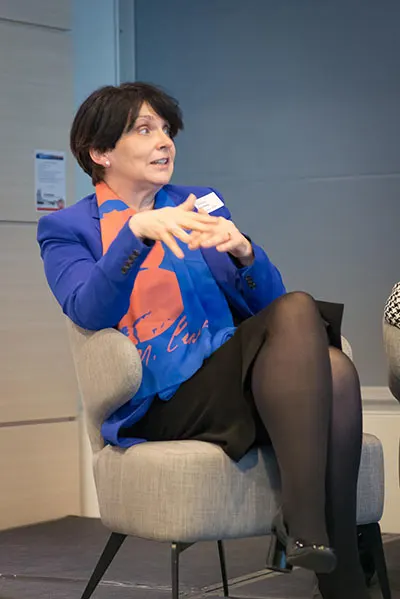
Prof Orla Feely, PhD, President of University College Dublin, is one of 15 university leaders featured on the podcast. (Photo by Denitsa Nikolova for Science|Business)
The Breaking the glass ceiling podcast features 15 prominent women university leaders in Europe. The series starts with Prof Maria Chiara Carrozza, President of Italy’s National Research Council; Prof Orla Feely; President of University College Dublin; Prof Rianne Letschert, President of Maastricht University, the Netherlands; and Kerstin Tham, Vice-chancellor of Malmö University, Sweden. The interviews are conducted by Ylann Schemm, Dr Sarah Main and Dr Lesley Thompson of Elsevier.
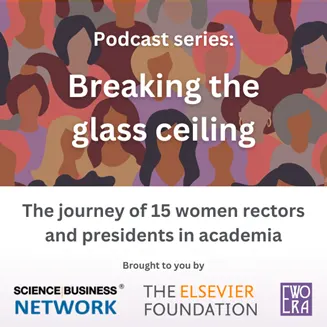
Federica Rosetta 在新的选项卡/窗口中打开, VP of Academic and Research Relations at Elsevier, helped forge the partnership behind the podcast campaign, noting that “by exploring the leaders’ personal journeys and their views on the barriers to leadership for women in academia, our goal has been to uncover what further interventions are required, and the cultural change we need to see across the sector and beyond.”
At the recent Science|Business 在新的选项卡/窗口中打开 conference in in Brussels, Moderator Maryline Fiaschi 在新的选项卡/窗口中打开, CEO of Science|Business, convened a panel on “Empowering women in science,” probing these questions further with two of the interviewees: Prof Feely and Prof Gülsün Sağlamer 在新的选项卡/窗口中打开, Founding Honorary President of EWORA. She challenged them to identify barriers for women research leaders in reaching the top, to comment on the pros and cons of gender quotas, and to recommend the best use of data for articulating challenges, benchmarking progress and developing evidence-based interventions.
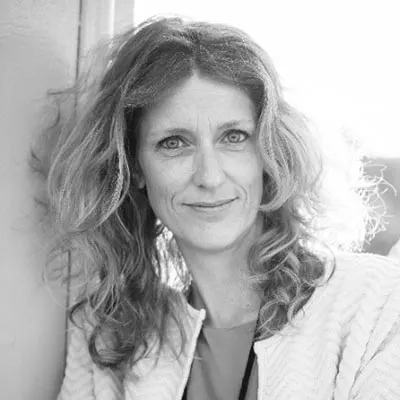
Federica Rosetta
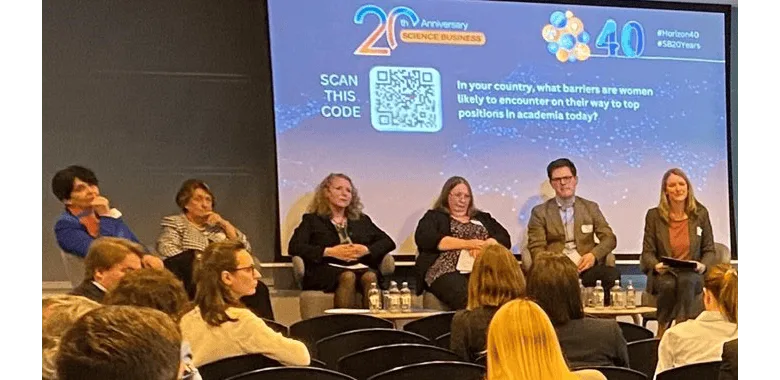
Science|Business panel on “Empowering women in science”: Prof Orla Feely, President, University College Dublin; Prof Gülsün Sağlamer, Founding Honorary President, European Women Rectors Association (EWORA); Ylann Schemm, Executive Director, the Elsevier Foundation; Amanda Crowfoot, Secretary General, European University Association; Bart Veys, Head of Policy Unit, COST Association; and Moderator Maryline Fiaschi, CEO of Science|Business. (Photo by Federica Rosetta)
Dr Sağlamer noted: “The power of these interviews lies in having role models asking difficult questions and sharing their experiences and challenges for the next generation.”
Ylann Schemm 在新的选项卡/窗口中打开, Executive Director of the Elsevier Foundation, underscored the importance of role modeling and recognition at every stage of women’s careers — even the most advanced. She also gave a sneak peak of Elsevier’s soon-to-be-released 2024 gender analytics report, noting women’s comparative strength in sustainability research, open access, policy, and citation metrics:
This is a clear call for the next European framework to broaden its indicators around research excellence to ensure that women’s contributions are fairly evaluated. Through our podcast interviews and this panel, we hope to offer some clear recommendations for the next European Framework.
The report, to be released in March, will feature key highlights from the project with a view to informing policymaking.
Highlights from the podcast
“It would be good if there could be dedicated funding for gender equality, equality, research, because I believe that there is still plenty of work that needs to be done, and separate funding should be dedicated to the research questions which are joined with gender equality.”

PMK
Prof Milena Králíčková, MD, PhD
Charles University 的 Rector
“We need people with a balance between their personal life and professional life. The more balance, the more effective you are as parent and also as researcher.”

PMCC
Prof Maria Chiara Carrozza, PhD
National Research Council, Italy 的 President
“Take control over your pathway, explore opportunities and enjoy the journey.”

POF
Prof Orla Feely, PhD
University College Dublin 的 President
Related stories and resources
Elsevier's gender reports
撰稿人

RC